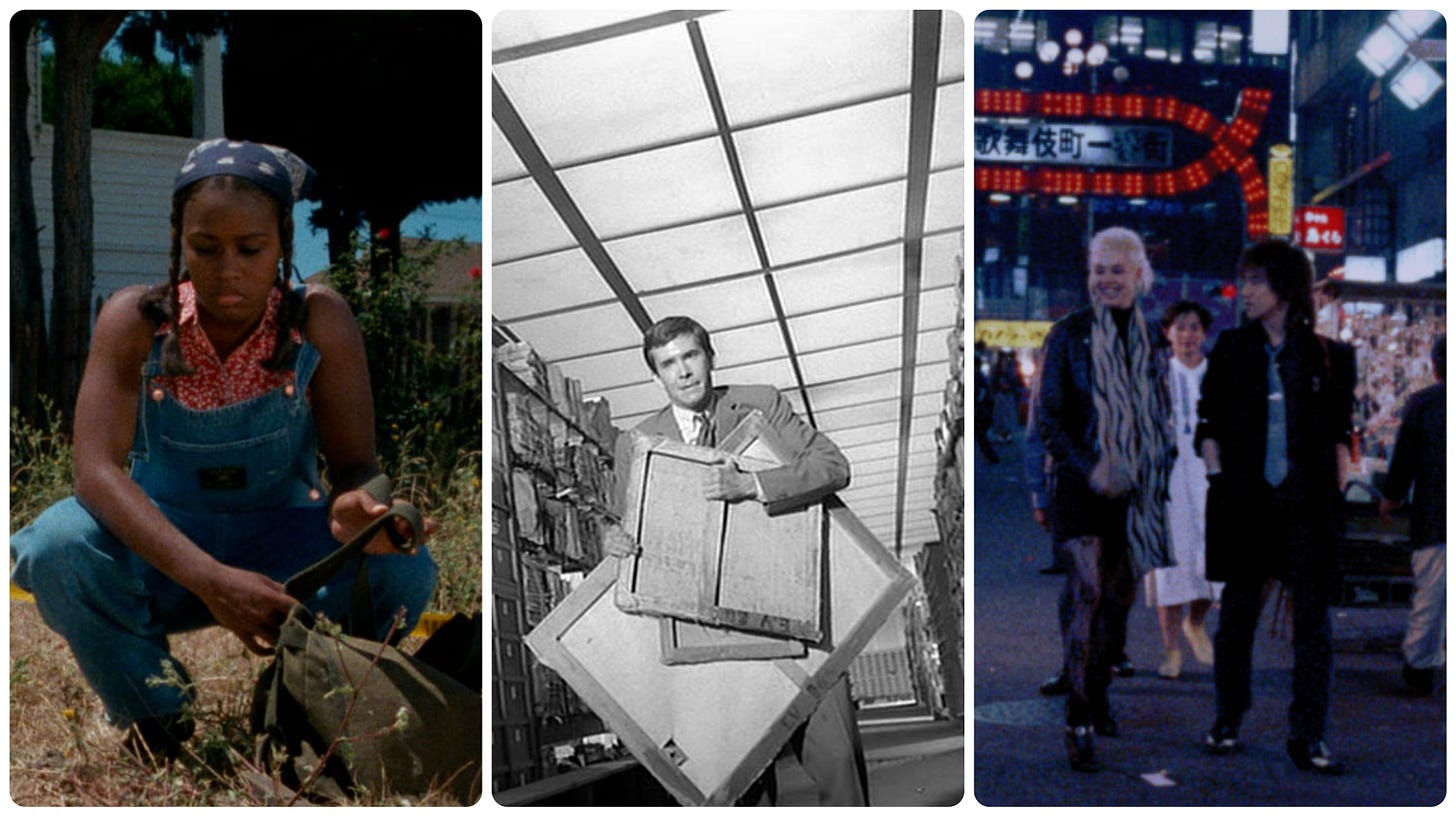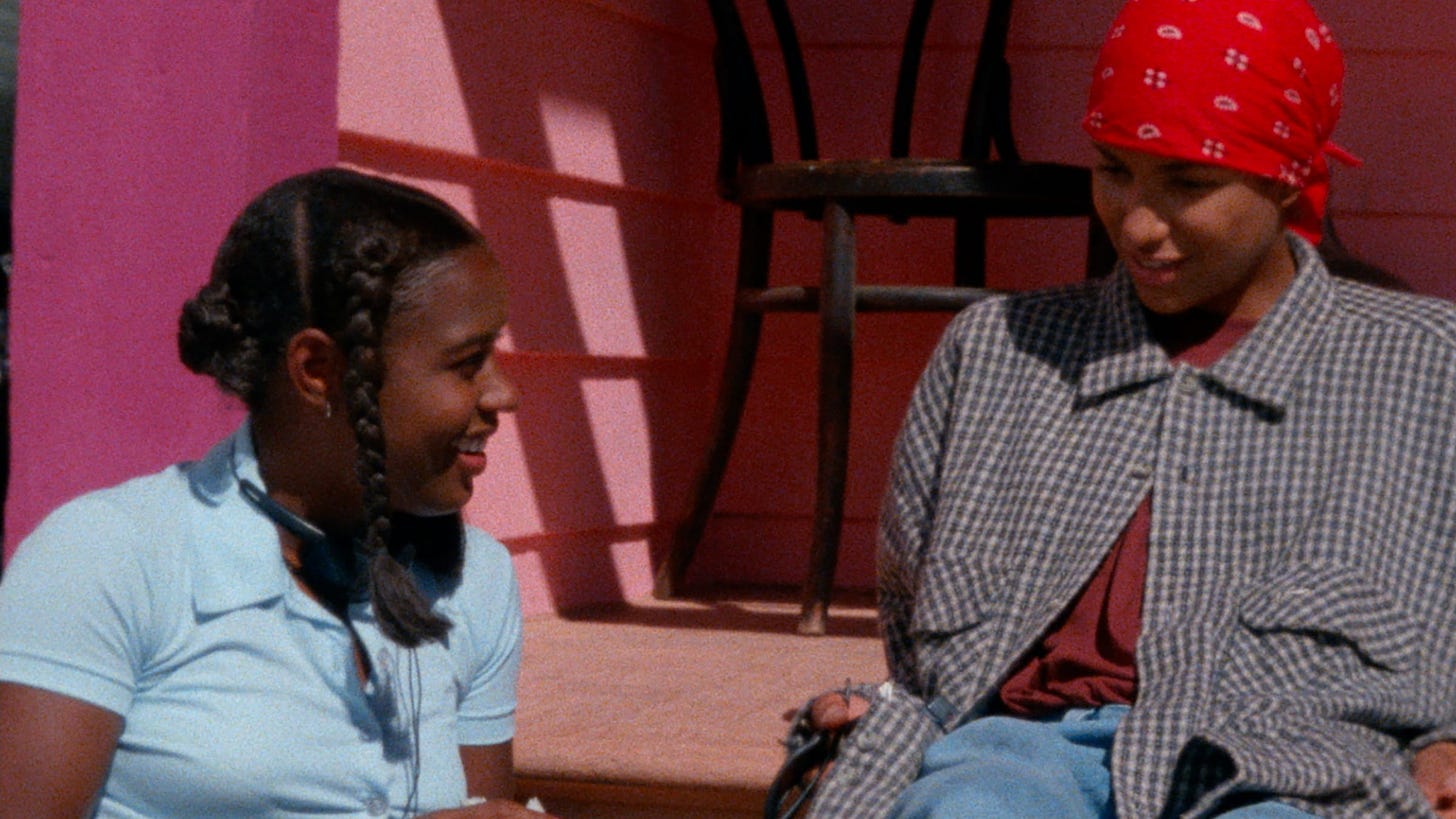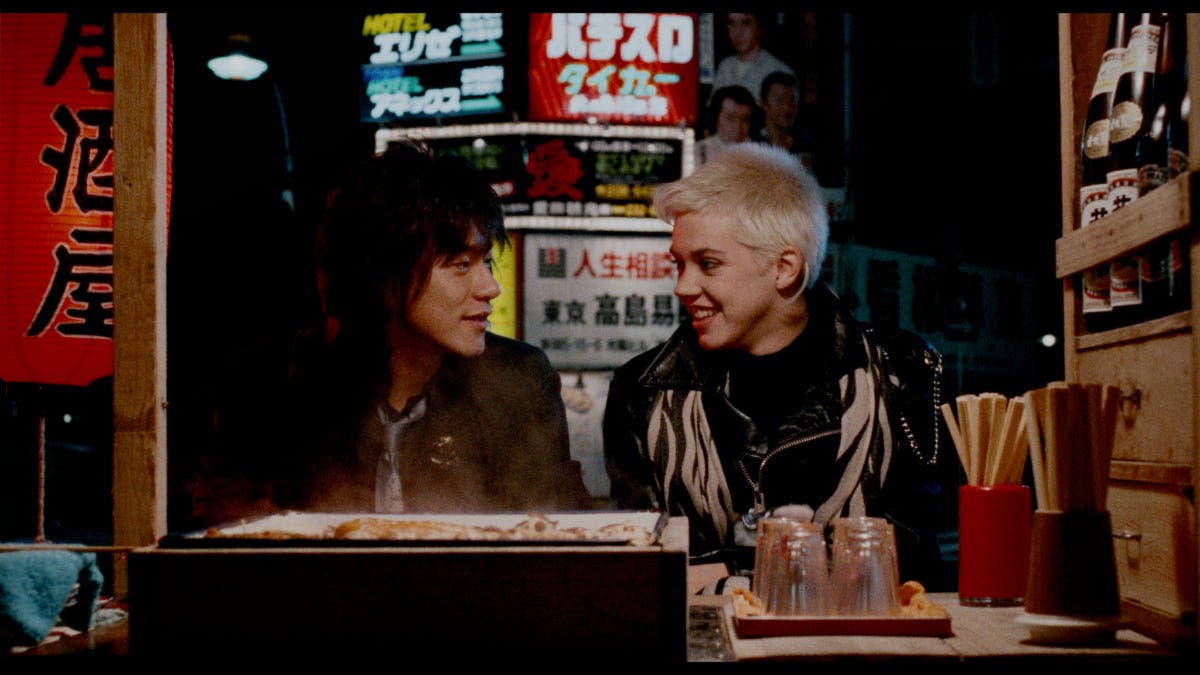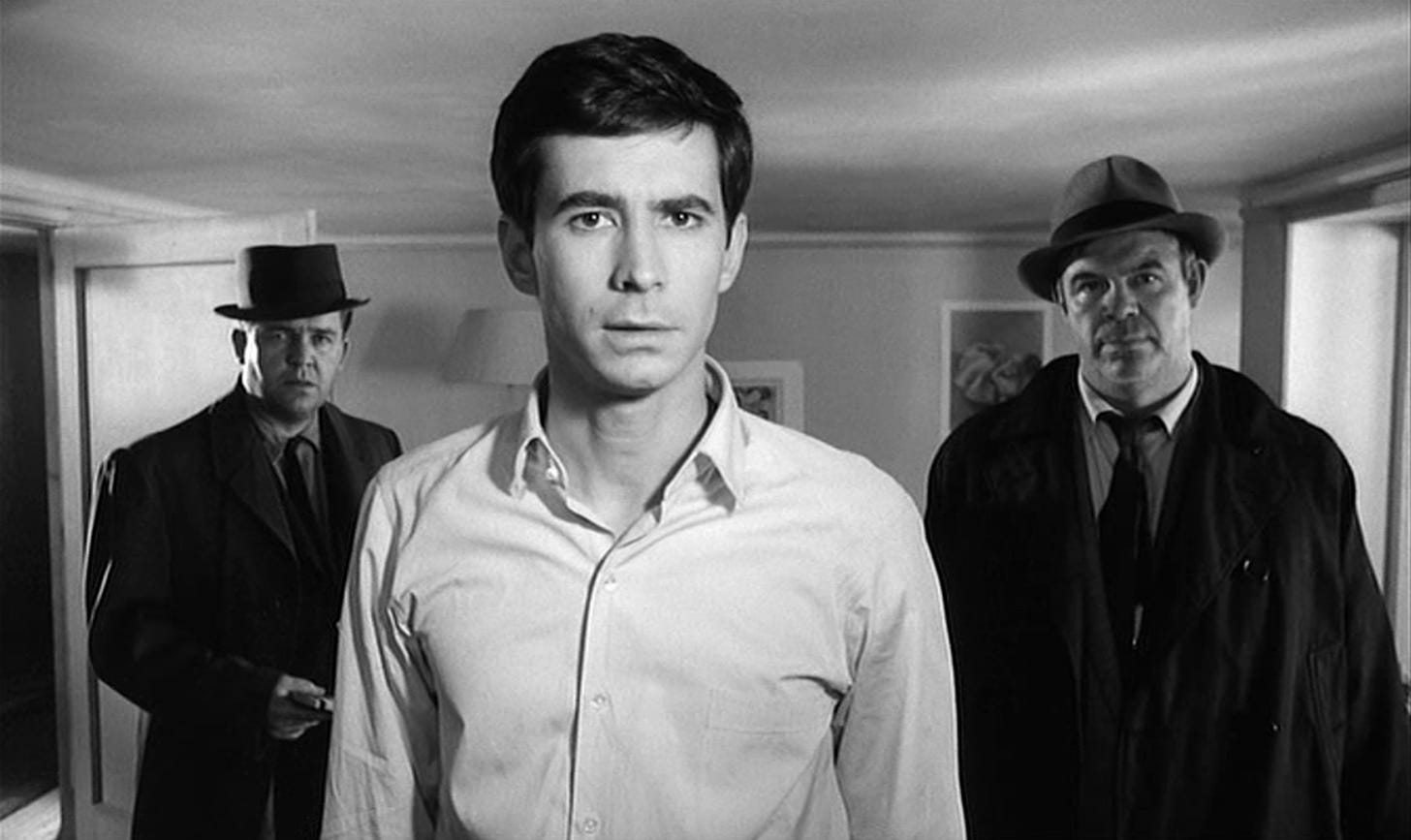Kafka, Polaroids, and Rock and Roll: Three 2023 Rediscoveries
This year's restorations and re-releases have included an Orson Welles take on a literary classic, an overlooked gem from the '90s, and a fun time capsule of 1980s Japan.
The jury’s still out on whether 2023 will be remembered as a great year for new movies, with a lot depending on what we’ll be seeing between now and the end of the year. (Though, as Scott confirmed last week and the week before, a lot of notable films have already seen release.) But it’s undoubtedly been a kind year for old movies. Fans of Return of the Jedi, Titanic, Crouching Tiger, Hidden Dragon, Oldboy, Farewell My Concubine, and, most recently, Stop Making Sense have gotten chances to see them on the big screen. (The curious and steel-willed even got a chance to see Gaspar Noé Irreversible recut into chronological order, for some reason.)
Those movies were, to one degree or another, hits the first time around. (One was even the most successful film ever made for many years.) But 2023 has also been notable for the resurfacing of films that didn’t find their audience the first time, for one reason or another. Below you’ll find three such films and where to watch them (and why they’re worth seeking out).
Drylongso (1998)
The first and to date only feature film directed by Cauleen Smith, Drylongso played the festival circuit in 1999 but never received a theatrical release until playing a few select engagements this year. Its fate prompted a frustrated Smith to abandon any feature film ambitions, steering her instead to a career in the fine art world, where she’s found considerable success making short films exhibited as part of installations. But Dryslongo suggests that that world’s gain has been the movie world’s loss. It’s the work of a filmmaker with a tremendous gift for depicting a vibrant community and the forces that threaten its undoing.
Toby Smith stars as Pica, an aspiring artist who butts heads with her photography teacher over Pica’s insistence on shooting Polaroids instead of using 35mm film. But Pica has her reasons, using the immediacy of instant cameras to document the Black men of her Oakland community, whom she views as an endangered species. While her project takes shape, Pica befriends Tobi (April Barnett), who takes to wearing men’s clothing after ending an abusive relationship, in the process discovering that the world perceives her differently when they no longer see her as a woman.
Dryslongo packs a lot into its brief running time, including a subplot about a serial killer preying on Tobi and Pica’s neighborhood. In an interview included on the new Criterion Collection edition of the film, Smith suggests perhaps “Black life is a polygenre experience.” She makes the pieces fit together, though, and combined they create a sense of a particular time and place and the passions and fears animating it. It looks like a time capsule now, but it could have been the first, promising feature in a long career.
Where to watch it: Dryslongo is now available on Blu-ray and DVD via Criterion but it’s still making the rounds in a few venues. It can also be rented and purchased through the usual services.
Tokyo Pop (1988)
A different sort of time capsule, Fran Rubel Kuzui’s Tokyo Pop captures Tokyo at the height of its neon-drenched ’80s as it follows Wendy (Carrie Hamilton), a frustrated American punk(ish) singer who, at the invitation of a friend, leaves New York for the promise of Japan. Upon arrival, however, her friend has disappeared, leaving Wendy to fend for herself. After finding lodging in a hotel filled with Mickey Mouse toys, she takes a job as a hostess at a karaoke bar. But when she hooks up with a rock band fronted by Hiro (Diamond Yukai, billed as Yutaka Tadokoro), she finds love and success before beginning to wonder if either is built to last. The film’s cast also includes the prolific Tetsurō Tamba in a fun performance as a sleazy music producer.
Kuzui’s debut, and her only directorial effort apart from the original theatrical version of Buffy the Vampire Slayer, was inspired in part by her experiences as a gaijin working in Japan, where she met and married producer Kaz Kuzui. Her film is uneven and a bit aimless, but its frothy sense of fun largely overwhelms those problems, as Hiro and Wendy’s ascent to pop stardom takes them from one memorable Tokyo locale to another. The film’s clear-eyed take on Wendy’s experiences stands in sharp contrast to the condescension of other ’80s culture clash comedies.
Tokyo Pop received largely warm reviews upon its release, then largely vanished after the VHS era. Its restoration was made possible by IndieCollect’s Jane Fonda Fund for Women Directors, whose effort included contributions from Dolly Parton and Carol Burnett, Hamilton’s mother. (Hamilton, who’s incredibly winning here, died in 2002 at the age of 38.)
Where to watch it: Tokyo Pop is making its way around the country ahead of its December 5th Blu-ray release by Kino Lorber.
The Trial (1962)
You might have heard a version of this story before: frustrated by a film industry inhospitable to his vision, Orson Welles took a different route to making a film, seeking financing from independent producers abroad. The production ran out of money and the film never got the audience it deserved in its day. But, in spite of it all, it’s quite brilliant. That description could be applied to Macbeth, Chimes at Midnight or a number of other Welles films (probably even more if he were able to complete every project he started). It certainly fits The Trial, Welles’ 1962 adaptation of Franz Kafka’s novel about a man arrested and forced to defend himself against an undefined crime.
In a 1981 Q&A session about the film included on the film’s new Criterion Collection edition, Welles reveals he took on the project not out of some burning passion to meld his vision with Kafka’s, but because The Trial seemed like the most filmable title on a list of 82 public domain literary works given to him by its producers. Be that as it may, it’s an inspired pairing, one that allows Welles to use outsized sets and brutalist architecture to indulge his gift for expressionism. (The film was shot across Europe, including Croatia and Paris’ Gare d’Orsay, now one of the world’s greatest art museums, then just an abandoned railway station.)
Tremulous but defiant, Anthony Perkins makes for a memorable Joseph K, whose determination to clear his name against whatever he’s been accused is overwhelmed time and again by an incoherent bureaucracy and an authoritarian government whose primary interest seems to be oppressing its citizens. Welles taps into the novel’s prescience, drawing visual parallels to the totalitarian regimes that appeared in the wake of the book’s 1925 publication, but also its timelessness. The nebulousness of the scenario leaves The Trial open to countless interpretations and Welles seems interested in closing down any of them. Hisstark, black-and-white world of inchoate fear and thwarted desire could be anybody’s nightmare.
Where to watch it: This 4K restoration still has a few theatrical dates scheduled. It’s also available on 4K and Blu-ray via the Criterion Collection and available to rent and purchase via many services.








The headline briefly got my hopes up that Soderbergh’s Kafka was finally emerging from its pan-and-scan VHS purgatory, but I’m happy to be adding The Trial to my ever-growing Welles Criterion Collection.
A memory that only makes sense to share here: I’d never seen TOKYO POP before. I can’t even remember seeing it in video stores at the time. But I knew of the movie because, for a few years in the late ‘80s/early ‘90s, its soundtrack was the ultimate CD cut-out bin item. You could find it seemingly everywhere and for super cheap. I had a friend who made money buying cheap CDs from one store and selling them at a profit at another and he always had a small stack of TOKYO POP discs to unload on unknowing suckers. Not sure the meager profit was work the effort, though.